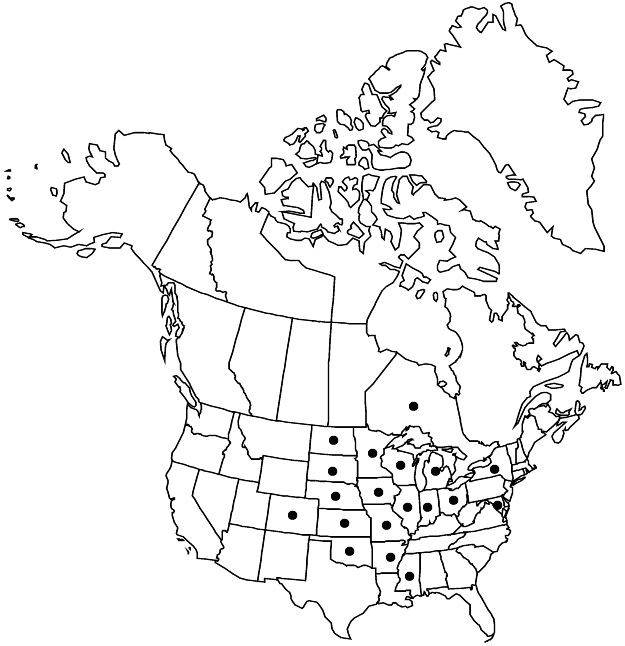Difference between revisions of "Physocarpus intermedius"
Ill. Handb. Laubholzk 1: 807. 1906.
FNA>Volume Importer |
FNA>Volume Importer |
||
| Line 11: | Line 11: | ||
|name=Opulaster intermedius | |name=Opulaster intermedius | ||
|authority=Rydberg | |authority=Rydberg | ||
| + | |rank=species | ||
|publication_title=N. L. Britton, Man. Fl. N. States, | |publication_title=N. L. Britton, Man. Fl. N. States, | ||
|publication_place=492. 1901 | |publication_place=492. 1901 | ||
| Line 17: | Line 18: | ||
|name=Physocarpus opulifolius var. intermedius | |name=Physocarpus opulifolius var. intermedius | ||
|authority=(Rydberg) B. L. Robinson | |authority=(Rydberg) B. L. Robinson | ||
| + | |rank=variety | ||
}} | }} | ||
|hierarchy=Rosaceae;Rosaceae subfam. Amygdaloideae;Rosaceae tribe Neillieae;Physocarpus;Physocarpus intermedius | |hierarchy=Rosaceae;Rosaceae subfam. Amygdaloideae;Rosaceae tribe Neillieae;Physocarpus;Physocarpus intermedius | ||
| Line 41: | Line 43: | ||
-->{{#Taxon: | -->{{#Taxon: | ||
name=Physocarpus intermedius | name=Physocarpus intermedius | ||
| − | |||
|authority=(Rydberg) C. K. Schneider | |authority=(Rydberg) C. K. Schneider | ||
|rank=species | |rank=species | ||
| Line 56: | Line 57: | ||
|publication year=1906 | |publication year=1906 | ||
|special status= | |special status= | ||
| − | |source xml=https://jpend@bitbucket.org/aafc-mbb/fna-data-curation.git/src/ | + | |source xml=https://jpend@bitbucket.org/aafc-mbb/fna-data-curation.git/src/f50eec43f223ca0e34566be0b046453a0960e173/coarse_grained_fna_xml/V9/V9_573.xml |
|subfamily=Rosaceae subfam. Amygdaloideae | |subfamily=Rosaceae subfam. Amygdaloideae | ||
|tribe=Rosaceae tribe Neillieae | |tribe=Rosaceae tribe Neillieae | ||
Revision as of 22:42, 16 December 2019
Shrubs, to 15 dm. Stems ascending to erect, ± glabrous. Leaves: stipules linear to narrowly ovate, 6 × 1.5 mm, apex acute; petiole 0.7–1.5 cm; blade orbiculate to broadly ovate, 3–6 × 2–4 cm, usually longer than wide, base broadly cuneate to truncate or slightly cordate, 3(–5)-lobed, margins deeply and irregularly crenate to doubly crenate, apex rounded to obtuse or acute, surfaces mostly glabrous, sometimes sparsely hairy abaxially. Inflorescences 15–20-flowered, dense, hemispheric racemes, 4 cm diam.; bracts elliptic to spatulate or rhombic, 5 × 2 mm, apex not recorded, faces glandular-dentate. Pedicels 1–2 cm, usually stellate-hairy. Flowers 10–12 mm diam.; hypanthium cup-shaped, 2 mm, moderately to densely stellate-hairy; sepals pale green to white, darker in center, triangular, 2.5–3.2 mm, apex sometimes obtuse, mucronate, gland-tipped, surfaces densely stellate-hairy; petals white, broadly elliptic to orbiculate, 5–6 × 5–6 mm; stamens shorter than or equal to petals; carpels 3–5, connate basally, densely stellate-hairy (sometimes only on sutures). Follicles 3–5, connate basally, ovoid, 5–8 mm (lengths ca. 2 times sepals), densely stellate-hairy (sometimes only on sutures); styles 4–5 mm. Seeds 2(–5), pyriform. 2n = 18.
Phenology: Flowering Jun; fruiting Jul–Sep.
Habitat: Rocky wooded hillsides in Picea and Pseudotsuga forests
Elevation: 100–2500 m
Distribution

Ont., Ark., Colo., Ill., Ind., Iowa, Kans., Md., Mich., Minn., Miss., Mo., Nebr., N.Y., N.Dak., Ohio, Okla., S.Dak., Wis., Mexico (Coahuila, Nuevo León).
Discussion
Physocarpus intermedius often has been treated as a variety of P. opulifolius; it can be distinguished by its densely hairy young carpels that remain hairy, at least on the sutures of the follicles. The species generally inhabits somewhat drier habitats than does P. opulifolius.
Selected References
None.